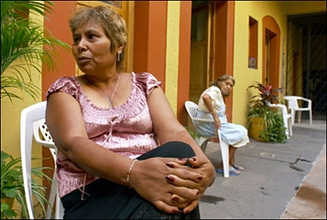 |
 |
 |
 News Around the Republic of Mexico | May 2007 News Around the Republic of Mexico | May 2007  
Old Homeless Prostitutes in Mexico Get a Home
 Sofia Miselem - Agence France Presse Sofia Miselem - Agence France Presse


| | With patience and determination, Munoz, now 59, set about convincing social groups and Mexico City authorities to let her use a dilapidated 18th century building that once housed a boxing museum, as a shelter for old prostitutes. (AFP/Ronaldo Schemidt) |
In need of cash to feed her 10 children, Carmen Munoz worked her street corner into the night. That's when she found out what befalls old prostitutes tossed aside by life and their families.

"It was very cold and I saw some cardboard boxes moving on the sidewalk. They were old prostitutes sleeping on the street, and right then and there I decided I had to do something about it," the former prostitute told AFP.

With patience and determination, Munoz, now 59, set about convincing social groups and Mexico City authorities to let her use a dilapidated 18th century building that once housed a boxing museum, as a shelter for old prostitutes.

She left the life she took up at 22 to put food on the table and it took years of coaxing, but finally, in February 2006 Casa Xochiquetzal (the Aztec goddess of "public women") was opened under Munoz's management.

It is not pretty and is located in La Merced, one of Mexico City's most violent neighborhoods, where street walkers charge less than four dollars a session, but Munoz is proud and her tenants are grateful for the facility.

"The only conditions they have to meet to come here is that they currently or formerly served as sex workers, are over 60 years of age and are living on the street with nobody supporting them," said Munoz.

Maria Canela, a former prostitute now 75, sweeps the doorway and greets all newcomers to Casa Xochiquetzal. Besides Munoz, she is the shelter's only resident to allow her name and picture to be published.

"When I was 16, my stepfather tried to abuse me and I left home. I only had four years of grammar school and there were few jobs as housemaid available, so I started working the street," said Canela, wincing from her arthritis.

"This is like my home now," she said about the shelter. "Before I used to sleep on the street. When I got some money from a client, I would rent a room for the night for 5.50 dollars."

She explained that since leaving her parents she only had a fixed address for three years, when she lived with "a good man" whom she eventually abandoned under pressure from his children.

To buy her staples, Canela sells sweets and cigarettes, but other residents of Casa Xochiquetzal still resort to prostitution now and again, for which they barely earn two dollars a time.

"Many of them have given up (prostitution) and when I see them going out I try to get them to stay. They come back dry-mouthed and worn out, but they tell me they need the money to buy soap so they can wash themselves," said Munoz.

In addition to being penniless, the old prostitutes all share the pain of having been abandoned by their children, relatives and companions.

"I have seven children whom I fed and put through school, but none of them want to see me now," said another 74-year-old former prostitute who preferred to remain anonymous.

"I had a companion who for 20 years kept me off the streets. He was a good man, but a younger woman came along and he left me. I've got siblings living a few blocks from here, but I know they reject me," she added.

Munoz and her tenants shed tears when they remembered May 10, Mothers' Day in Mexico.

"When the children are small there's no problem and you bring them up," said Munoz. "But when they become adults and they find out what it is we do, they're ashamed and tell us to keep away."

"They didn't come to see us on May 10. We threw a small party but only a few children, all strangers, came and gave us some gifts," added the shelter manager.

But Casa Xochiquetzal also has its share of happy days, when its 20 residents, music blaring, dance and sing together; when they gather round the meeting hall to share amusing war stories.

There is also the occasional squabble.

"Life on the street is very tough and we become aggressive," said Munoz. "We're also old women behaving like children, but we're better off here where we have a roof and food to eat." | 
 | |
 |



